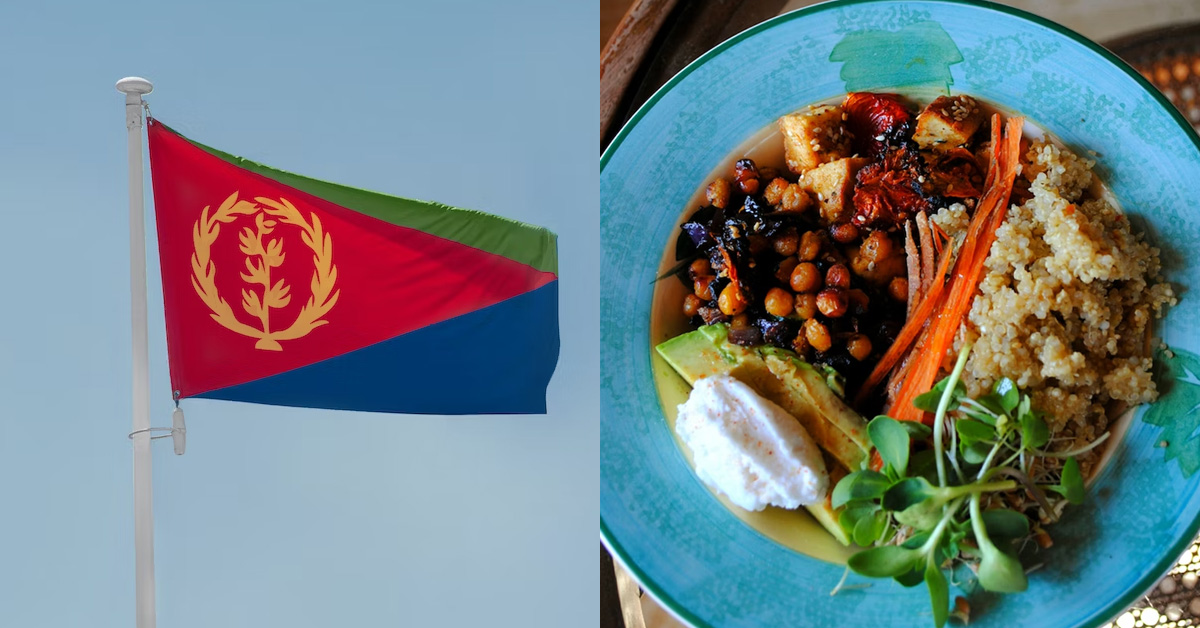Eritrean cuisine is a unique blend of African, Middle Eastern, and Mediterranean flavors. Located in the Horn of Africa, Eritrea has a rich culinary history that has been influenced by its diverse cultural heritage.
The country’s cuisine is characterized by its use of spices, herbs, and grains, as well as its emphasis on communal dining. Eritrean food is known for its bold and complex flavors, and it is often enjoyed with injera, a sourdough flatbread that is used to scoop up stews and sauces.
Eritrean cuisine halal or not?
Is Eritrean food halal?
Yes, Eritrean food is generally halal as the majority of the population is Muslim and follows halal dietary laws.
However, it is always recommended to confirm with the restaurant or chef about the ingredients and preparation methods to ensure that the food is halal.
What kind of food do Eritrean eat?
Eritrean cuisine is a fusion of African, Middle Eastern, and Mediterranean flavors. Some popular dishes include:
- Injera: A sourdough flatbread made from teff flour and served with stews and curries.
- Zigni: A spicy beef stew made with berbere spice mix, onions, and tomatoes.
- Tibs: Grilled or sautéed meat (usually beef or lamb) served with injera or bread.
- Shiro: A thick stew made from ground chickpeas or lentils, onions, and spices.
- Ful: A dish made from fava beans, onions, tomatoes, and spices.
- Tsebhi: A stew made with chicken, lamb, or beef, and flavored with spices like cumin, coriander, and cardamom.
- Bazeen: A porridge made from barley flour and served with meat or vegetable stews.
- Suwa: A traditional Eritrean beer made from fermented sorghum or millet.
- Coffee: Eritrea is known for its strong, flavorful coffee, which is often served with popcorn or peanuts.
How can you tell if the food is halal in Eritrea?
In Eritrea, the majority of the population is Muslim, and halal food is widely available. However, it is always best to confirm with the restaurant or food vendor if the food is halal.
You can also look for halal certification symbols or ask for a halal certificate from the supplier.
Additionally, you can ask the locals or consult with the local Islamic center for recommendations on halal food options.
Is it hard to find halal food in Eritrea?
According to research, Eritrea is a predominantly Muslim country, and halal food is widely available. Most restaurants and food vendors in Eritrea serve halal food, and there are also specialized halal restaurants in major cities like Asmara.
However, it is always advisable to confirm the halal status of the food before consuming it.
Is Eritrean food healthy?
Eritrean cuisine is generally considered healthy as it is based on fresh and natural ingredients such as vegetables, legumes, and grains. The cuisine is also low in fat and sugar, and often includes grilled or roasted meats.
However, like any cuisine, the healthiness of Eritrean food depends on the specific dishes and cooking methods used. Some dishes may be high in salt or oil, so it is important to make informed choices when selecting dishes.
What is Eritrean food similar to?
Eritrean food is similar to Ethiopian cuisine, as both countries share similar cultural and historical backgrounds. The cuisine is characterized by a variety of stews, curries, and bread made from teff flour.
The dishes are often served on a large communal platter and eaten with injera, a sourdough flatbread. Eritrean cuisine also features a variety of vegetarian and meat-based dishes, including lentil stews, spicy chicken, and beef dishes.
Steps to find halal food in Eritrea
Here are some tips to find halal food in Eritrea:
- Research halal food options in Eritrea: Start by researching halal food options in Eritrea. You can use online resources such as HalalTrip or Zabihah to find halal restaurants and food options in Eritrea.
- Ask locals: Ask locals for recommendations on halal food options in Eritrea. They may be able to suggest halal restaurants or markets that offer halal food.
- Check food labels: When shopping for food, check the labels to ensure that the food is halal. Look for the halal certification symbol on the packaging.
- Visit halal restaurants: Visit halal restaurants in Eritrea to enjoy halal food. You can ask the restaurant staff about the halal status of the food and the ingredients used.
- Look for Muslim-owned businesses: Look for Muslim-owned businesses in Eritrea that offer halal food. These businesses may be more likely to offer halal food options.
- Use halal food apps: Use halal food apps such as HalalTrip or Zabihah to find halal food options in Eritrea. These apps can help you locate halal restaurants and food options in your area.
- Ask for recommendations: Ask for recommendations from other Muslims in Eritrea. They may be able to suggest halal food options that are not listed online or in apps.

